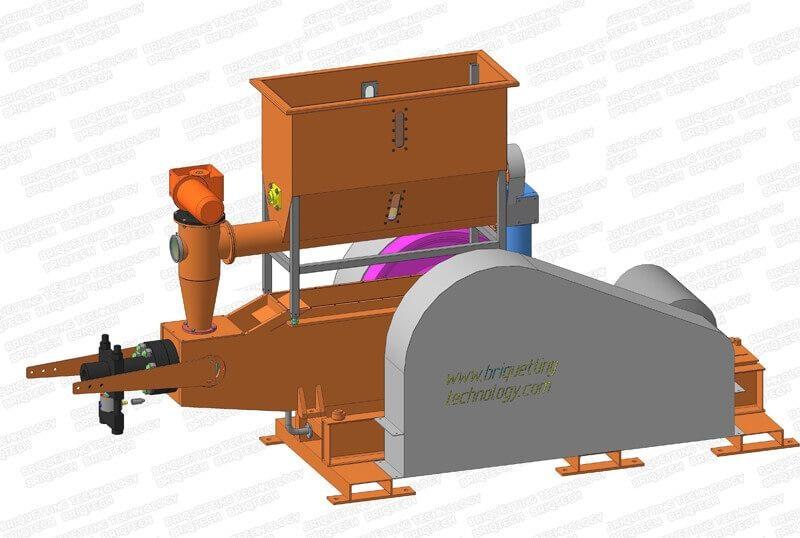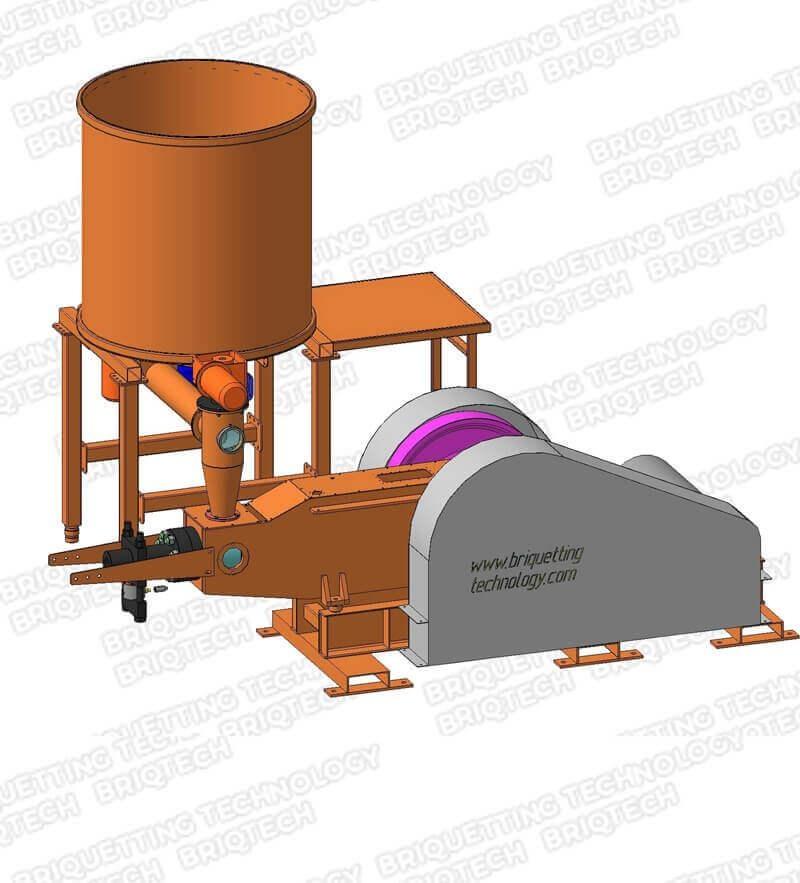Briquette Press - Briquetting Machine - Briquetting Press
BriqTech mechanical briquetting press model: BT-060-400 Mechanical briquetting press BriqTech model: BT-065-500
Mechanical briquetting press BriqTech model: BT-070-800 Mechanical briquetting press BriqTech model: BT-070-800Max
 Rapeseed-straw briquetting machine, BriqTech series - Sawdust briquette press, BriqTech series - Sawdust briquetting machines, BriqTech series
Rapeseed-straw briquetting machine, BriqTech series - Sawdust briquette press, BriqTech series - Sawdust briquetting machines, BriqTech series
 |
 |
 |
 |
Mechanical briquetting press BriqTech model: rapeseed-straw mechanical - Sawdust mechanical briquette presses Mechanical biomass briquette press - Sawdust mechanical briquetting presses
Biomass waste briquette press - Forest waste briquette machine
Why choose a mechanical piston briquetting press, operated by a flywheel, instead of a hydraulic press or an extrusion press?
The principle of the mechanical briquetting press lies in the crank mechanism that converts rotational motion into linear motion of the piston pusher of the briquetting press. The raw material is compressed in a forming channel without adhesives or binders, resulting in briquettes (solid fuel). To maximize profits from briquette production from biomass waste, the robustness and quality of the equipment, as well as the raw material and business partners, play a crucial role. Briquettes are used in heating systems, stoves, wood-fired ovens, and have higher calorific value and efficiency compared to firewood, making them 100% ecological!
A mechanical piston briquetting press has a lower purchase cost, lower operating costs, and a longer lifespan compared to hydraulic presses or extrusion presses with resistance (Pini Kay briquettes). The "BriqTech" mechanical piston briquette press of the "Nestro" type is the right choice for any type of raw material containing lignin.
"BriqTech" briquetting presses models: BT-065-500, BT-070-800, BT-070-800Max now receive a new optional feature: Hydraulic automation for the tightening of the briquette press head and preheating/heating of the conical sleeve. This includes preheating the conical sleeve before starting or during the operation of the briquetting press -> Automatic hydraulic tightening or releasing of jaws -> The automatic hydraulic mode greatly simplifies the operation of the press for briquette production. This feature allows the press to produce more kilograms of briquettes per hour and ensures a more stable production without operator intervention.
Today, the desire to profit in this field requires just an impulse to initiate a successful business.
A good example is the utilization of biomass waste and the production of briquettes from forest waste and plant residues containing lignin.
The trend demonstrates that businesses initiated in this sector enjoy profitability, but the main aspect is the high quality of briquette production equipment. "Briquetting Technology" as a manufacturer respects the quality of the equipment, while offering the best innovations and complete solutions on the market.
The basic principles for choosing briquette production equipment are functionality, reliability, user-friendliness, availability of spare parts, service, warranty, and after-sales support.
"Briquetting Technology," in the "BriqTech" series, offers the highest quality briquetting machines for briquette production. It provides the opportunity to create briquetting lines for processing wood, sawdust, straw, and other lignin-containing waste.
We return to our plan of building your successful business.
The first step is the raw material.
Currently, the variety of materials used to make briquettes is extensive: wood waste, sawdust, tree roots, plant residues, wheat straw, sunflower husks, rapeseed, soybean, corn stalks, etc.
To obtain a high-quality end product (briquettes), the raw material must be adequately dried and homogenized in terms of moisture content, unless an aerodynamic dryer or rotary dryer is used. The moisture content should be around 10-12-14-16%, and the fraction (granulation) of the raw material should be between 3-8 mm. Otherwise, drying and shredding of the raw material are necessary.
The next step is having an appropriate space for briquette production. You should also consider the volume and dimensions of the briquetting equipment. As a guide, a minimum space of 120-150 square meters, a 400V three-phase power supply with a capacity of up to 100-150 kW, and personnel (2-4 employees depending on the briquetting line and working shifts) are needed for the proper installation of the briquetting equipment.
Another crucial aspect to mention is the consumption of 50% of the total installed power. Compensating for inductive reactive energy through capacitor banks significantly reduces the cost of energy bills.
This guide provides you with some recommendations for starting a successful business, and we are here to assist you with any questions or clarifications.
"Briquetting Technology" offers a 24-month warranty from the start of operation. The post-warranty period is a minimum of 10 years.
A crucial aspect in ensuring the proper functioning of briquetting equipment is the efficient supply of necessary spare parts. From this perspective, our company maintains a permanent stock of spare parts and consumables. Spare parts that are not in stock can be ordered and delivered within a period of 5 to 30 days.
